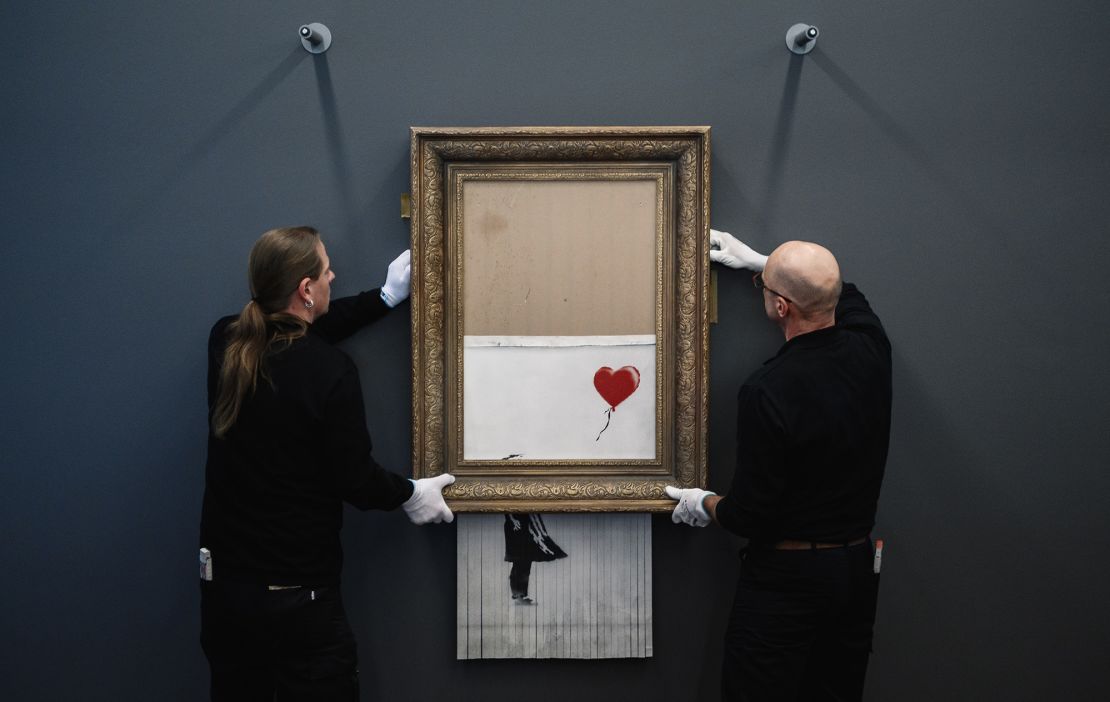CNN
—
Anonymity lies at the center of the mythology surrounding the elusive street artist Banksy, but he may have revealed his name in a resurfaced interview.
First recorded in 2003, the interview was released Tuesday as a bonus episode of the BBC podcast series “The Banksy Story.”
When former BBC arts correspondent Nigel Wrench asked Banksy whether his name was “Robert Banks,” as The Independent newspaper had reported at the time, the artist responded: “It’s Robbie.”
Wrench shared the archival interview with podcast host James Peak, a self-confessed “super fan” of Banksy’s work, after hearing the 10-episode series that had charted the artist’s rise and included an unverified recording of his voice from a recovered 2005 interview with US National Public Radio (NPR).
However, all might not be as it seems, as is so often the case with Banksy – an artist known for his satirical humor, subversive methods and anti-authority themes.
“A name comes out,” Peak told CNN Tuesday. “Is it the right name? Is it a clever joke?” Peak added, alluding to the fact that a name like Robbie Banks could be a good pun.

Shielded by his anonymity, Banksy’s distinctive graffiti art has popped up around the world, appearing on the walls of bombed buildings in Ukraine, on T-shirts to support protesters facing trial for toppling the statue of slave trader Edward Colston during 2020 Black Lives Matter protests in England, and in Paris, highlighting Europe’s migrant crisis in 2018.
His 2003 show, which opened shortly after his interview with Wrench, featured graffitied police vans, an image of Winston Churchill with a grass Mohican and live farm animals painted with the Metropolitan Police’s blue-checked patterns.
Banksy talks about these political themes within his work with Wrench, revealing the “kernel” of his early ideas before he became a global icon, as he considered the merits of using graffiti as a means to produce art, Peak said.
“If you are a guy making art that sells for ridiculous sums of money and you have this… administration around you, I have often wondered how pure you can be in your intention and art,” Peak added.
“And what strikes me listening to this interview is all that is present and correct… it’s almost like he’s made up his mind about… what his art is for and the means of engagement for it.”
Politics, vandalism and anarchy
Despite these political themes that have marked his work from early on, Banksy told Wrench in 2003 that he didn’t consider himself to be “that political.”
He added: “If you think about anything about your life for longer than a second, then you have to work out that the shoes you wear are made by somebody on a pathetic amount of money and the coffee you drink means somebody, somewhere in the world is getting done over.”
Speaking about vandalism and his approach to art, Banksy said: “[Vandalism] is a quicker way of making your point.”
“For me, the golden aim really is… it takes you less time to make it than it takes for people to look at it,” he added.
Asked whether his exhibition was about anarchism, Banksy told Wrench: “I’m interested in injustice. Who has the right to judge anybody else? If you’ve ever fallen foul of the justice system then it turns you very skeptical about everything, so I guess I like to turn it on its head a little bit… I’m into working out who really is the good guys.”
Listening to the archival interview has only increased his admiration of Banksy, Peak said, an admiration that grew from realizing the artistic “brilliance” but also the “warm and human and kind and progressive and liberal… sentiments” underpinning it.

